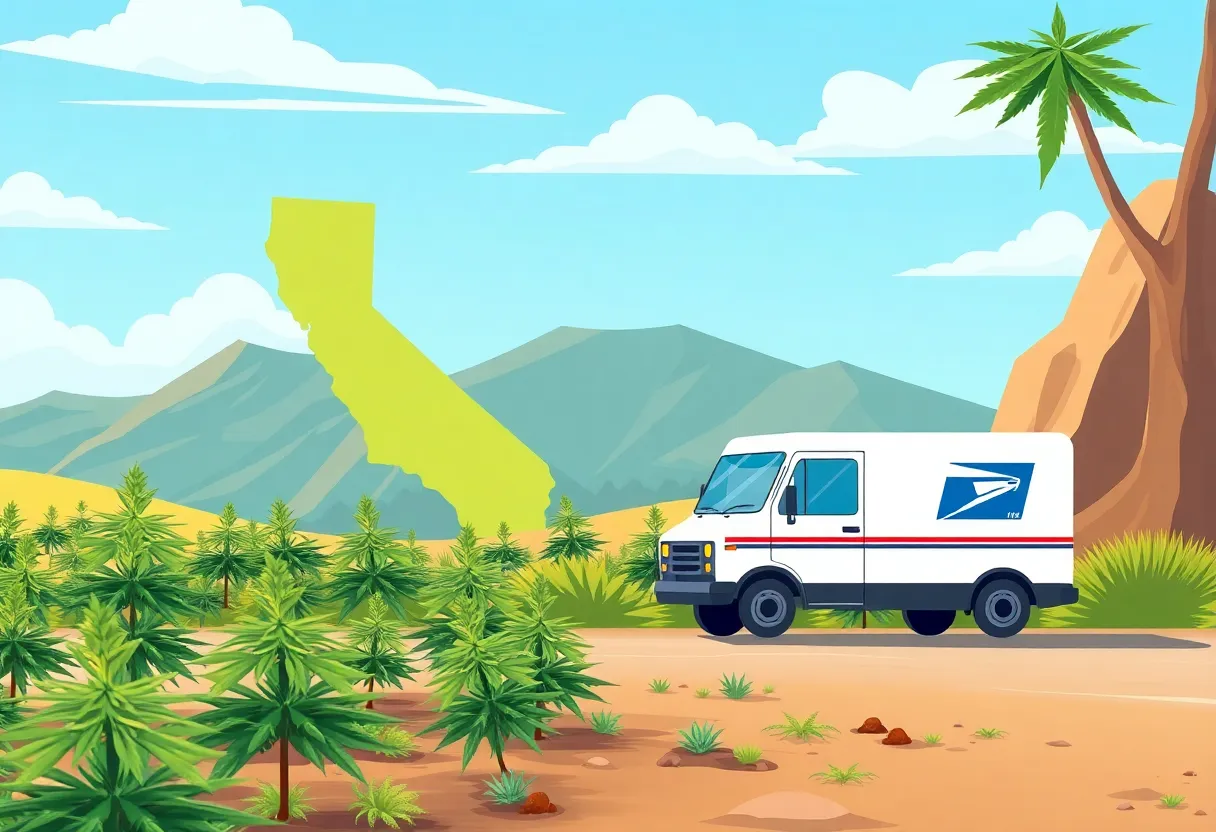California, October 16, 2025
News Summary
Governor Gavin Newsom has vetoed Assembly Bill 1332, which aimed to allow licensed microbusinesses to ship medical cannabis directly to patients via common carriers. The bill received overwhelming support, passing unanimously in both the Senate and House but was vetoed due to concerns over administrative complexities. With medical cannabis sales projected to drop significantly, this decision raises challenges for patients seeking access to necessary products, as many still face barriers within an unregulated market.
California Governor Gavin Newsom has vetoed Assembly Bill 1332 on October 11, 2023. The legislation aimed to enhance patient access to medical cannabis by permitting licensed microbusinesses to ship products directly to patients using common carriers like UPS or FedEx. The bill had garnered robust support, passing unanimously in both the California Senate with a vote of 39-0 and the House with a vote of 78-0 before landing on Newsom’s desk.
In his veto, Newsom expressed concerns that the proposed direct-shipping program would be burdensome and overly complex to administer. This veto comes at a critical time when medical cannabis sales in California are projected to decline sharply,预计【gel】【te【te【 год며】을【gel】 거다는 확인섭트【gel】 200 million dollars in 2025, down from approximately 540 million dollars in 2021. Medical cannabis currently makes up roughly 4% of California’s licensed marketplace, highlighting a steep decline from previous years.
The Department of Cannabis Control (DCC) would need to revamp California’s cannabis track-and-trace system to implement the direct shipping program, which would incur significant costs and time. A fiscal analysis suggested a one-time implementation cost of about 269,000 dollars and ongoing annual costs of approximately 472,000 dollars to oversee compliance with the direct shipping system. Despite these figures, Newsom noted that the annual costs represent less than 0.05% of the state’s taxable cannabis revenue from the past year.
Proponents of A.B. 1332 argued that the bill was crucial for patient access, as it would only allow two businesses to ship medical cannabis directly to patients. According to DCC data, there are 290 active microbusiness licenses in California, with over 50 holding licenses for retail, manufacturing, distribution, and cultivation. The veto underscores the ongoing challenges faced by medical cannabis patients, many of whom struggle to find specialized products that are not available in local dispensaries.
Advocates contend that high taxes and limited access have driven medical cannabis patients into the unregulated market. Although California was the first state to legalize medical cannabis via Proposition 215 in 1996, over 57% of California cities and counties still prohibit cannabis dispensaries. To be exempt from the state’s sales-and-use tax, which can be as high as 200 dollars, medical cannabis patients are required to obtain a Medical Marijuana Identification Card (MMIC) from local health departments.
Proponents of A.B. 1332 highlighted that many patients with specific medical conditions, such as intractable epilepsy and advanced cancers, have been struggling to access the products they need. A three-year sunset provision was included in A.B. 1332, allowing lawmakers to reassess its effectiveness in addressing patient access issues. While Newsom vetoed this bill, he remains open to exploring alternative strategies with legislators to enhance equitable access to medical cannabis in the future.
Frequently Asked Questions
What was Assembly Bill 1332 aimed at doing?
The bill aimed to expand patient access to medical cannabis by allowing licensed microbusinesses to ship products directly to patients using common carriers like UPS or FedEx.
Who sponsored the legislation?
The legislation was sponsored by Assemblymember Patrick Ahrens (D-Silicon Valley).
What was the outcome of the bill before the governor’s veto?
A.B. 1332 passed unanimously in both the California Senate (39-0) and House (78-0).
What were Governor Newsom’s concerns about the bill?
Newsom expressed that the proposed direct-shipping program would be burdensome and overly complex to administer.
What is the current state of medical cannabis sales in California?
Medical cannabis sales in California are projected to dip below 200 million dollars in 2025, down from approximately 540 million dollars in 2021.
How many active microbusiness licenses are there in California?
There are 290 active microbusiness licenses in California.
Key Features of Assembly Bill 1332
| Feature | Description |
|---|---|
| Bill Name | Assembly Bill 1332 |
| Goal | Expand patient access to medical cannabis through direct shipping by licensed microbusinesses. |
| Proponent | Assemblymember Patrick Ahrens (D-Silicon Valley) |
| Vote Outcome | Passed 39-0 in Senate and 78-0 in House |
| Governor’s Concerns | Complexity and burden of administration for the proposed shipping program. |
| Projected Cannabis Sales | Expected to fall below 200 million dollars in 2025. |
| Active Microbusiness Licenses | 290 in California |
Deeper Dive: News & Info About This Topic
- Business of Cannabis
- Cannabis Business Times
- Ganjapreneur
- Encyclopedia Britannica: Medical Marijuana Debate
- U.S. News & World Report: Marijuana Legalization

Author: STAFF HERE HOLLYWOOD
The Hollywood Staff Writer represents the experienced team at HEREHollywood.com, your go-to source for actionable local news and information in Hollywood, Los Angeles County, and beyond. Specializing in "news you can use," we cover essential topics like product reviews for personal and business needs, local business directories, politics, real estate trends, neighborhood insights, and state news affecting the area—with deep expertise drawn from years of dedicated reporting and strong community input, including local press releases and business updates. We deliver top reporting on high-value events such as the Hollywood Bowl summer concerts, the Hollywood Christmas Parade, film premieres at TCL Chinese Theatre, and festivals at the Magic Castle. Our coverage extends to key organizations like the Hollywood Chamber of Commerce and Visit Hollywood, plus leading businesses in entertainment, dining, and tourism that define the local economy. As part of the broader HERE network, including HERELosAngeles.com, HEREBeverlyHills.com, HEREAnaheim.com, and HEREHuntingtonBeach.com, we provide comprehensive, credible insights into Southern California's dynamic landscape.





